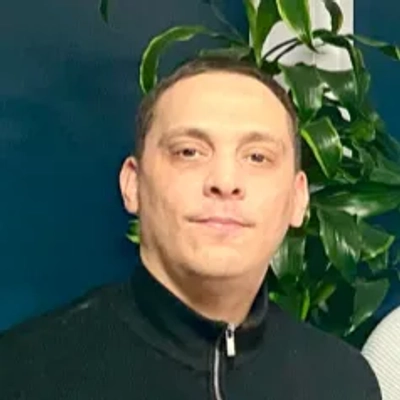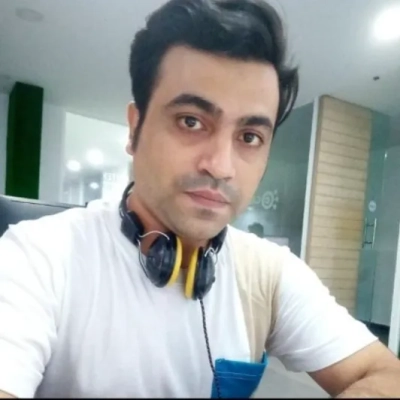How to Stay Motivated On Long Software Development Projects
Unlock the secrets to enduring long software development projects with advice straight from the industry's experts. This article offers practical strategies for maintaining motivation and productivity over the long haul. Discover tried-and-true methods that have been honed by professionals to keep your team inspired and your projects on track.
- Practice Time-Blocking With Intentional Breaks
- Break Projects Into Achievable Milestones
- Build A Culture Of Connection
- Focus On Smaller, Manageable Tasks
- Celebrate Every Win Along The Way
- Set Clear Boundaries Between Work And Personal Time
- Transform Projects Into Sequences Of Sprints
- Leverage AI For Process Automation
- Break Work Into Smaller, Manageable Tasks
- Take Breaks For Personal Projects
- Implement Structured Breaks And Prioritize Balance
- Connect Innovations To Real-World Health Impacts
- Set Clear Goals And Break Into Tasks
Practice Time-Blocking With Intentional Breaks
One strategy that helps me stay motivated and avoid burnout during demanding projects is practicing time-blocking with intentional breaks. I divide my day into focused work sessions, typically 90 minutes, followed by a 15-20-minute break. During these breaks, I step away from my desk entirely—whether it's taking a short walk, doing a quick workout, or even meditating.
This approach not only keeps my energy levels consistent but also allows me to reflect on progress, adjust priorities, and return to work with renewed focus. For example, during a particularly intense sprint to meet a client deadline, this method helped me maintain a clear head and avoid the feeling of overwhelm, ensuring I stayed productive without compromising my well-being.
My advice is to schedule breaks as intentionally as you schedule work. Treat them as non-negotiable appointments with yourself. This simple habit can transform how you manage stress and sustain motivation in long-term projects.

Break Projects Into Achievable Milestones
When working on long and demanding software development projects, I stay motivated by breaking the project into smaller, achievable milestones and celebrating progress along the way. It's easy to feel overwhelmed when looking at the entire scope of a project, so I focus on one task or sprint at a time. Hitting those smaller goals gives me a sense of accomplishment and keeps me energized for the next phase.
One strategy that works well for me is using a visual tool like a Kanban board. Seeing tasks move from "To Do" to "Done" creates momentum and helps me feel productive, even on tough days. I also make it a point to step away when I need to. Whether it's taking a walk, doing something creative, or just getting enough sleep, giving myself those breaks keeps burnout at bay and lets me come back to the project with fresh eyes and a clear mind.

Build A Culture Of Connection
One strategy I've found invaluable in staying motivated and avoiding burnout during long, demanding software development projects is building and nurturing a culture of connection within the team.
At our company, we implement what we call "Project Rhythm Breakers." These are short, team-driven rituals designed to refresh minds and reinforce collaboration without sacrificing productivity. For instance, every Friday afternoon, we hold "Innovation Roulette." It's a casual session where team members can share a quick idea unrelated to the project—a potential feature, a tool they've discovered, or even a coding shortcut. These sessions are not only energizing but often spark creative solutions for our ongoing work.
We also ensure that developers feel empowered to voice concerns and suggest changes. Sometimes, what appears to be burnout is a symptom of inefficiency or miscommunication. By encouraging open dialogue, we address bottlenecks proactively, making projects feel more manageable and rewarding.
Focus On Smaller, Manageable Tasks
Avoiding burnout can be a real challenge when a software development project is a long one, so what I do is focus on breaking up the work into some smaller, more manageable tasks for myself. For me, I find that completing these smaller tasks helps me have some easy wins as I work through the project. And that goes a long way in helping me stay motivated. I think it also gives me this momentum that not only helps me keep going, but keeps it from feeling like it's too much or too big of a project. I also make sure to schedule myself some regular breaks so that I can work on maintaining a healthy work-life balance. These things are what help me the most.

Celebrate Every Win Along The Way
Staying Motivated During Long Software Development Projects: My Go-To Strategy
When you're deep into a long and demanding software development project, motivation can feel like a finite resource. Deadlines pile up, bugs persist, and the excitement of starting something new fades into the grind of debugging and iteration. Over the years, I've learned that staying motivated isn't just about powering through—it's about managing your energy and finding joy in the process.
One strategy that's worked wonders for me is breaking the project into smaller milestones and celebrating every win along the way. It might sound simple, but it's a game-changer. Here's how I make it work:
At the start of a project, I break it into bite-sized milestones—ones that are challenging but achievable within a week or two. I set up a document to be formatted like an essay outline that a teacher would make me write back in high school. Instead of focusing on the massive end goal (like a finished product or major launch), I set my sights on completing each milestone as if it's its own mini-project.
Celebrating doesn't have to be elaborate. It's about taking a moment to acknowledge the effort and progress you've made. That quick boost of accomplishment fuels me to tackle the next challenge with renewed energy.
This approach also helps prevent burnout because it creates natural points of rest. By pausing to reflect on each win, I avoid the feeling of an endless grind and keep the momentum going.
Another bonus? It helps me stay connected to why I'm working on the project in the first place. Each milestone reminds me that the work I'm doing is meaningful—not just a step toward the finish line but an opportunity to build something I'm proud of.
The takeaway? Motivation isn't about brute-forcing your way through a long project. It's about creating a rhythm of progress and celebration that keeps you engaged, energized, and focused. Break it down, celebrate often, and remember: every small step forward is still a step toward greatness.

Set Clear Boundaries Between Work And Personal Time
Staying motivated during long and demanding software development projects requires setting clear boundaries between work and personal time. Early in my career, I found myself working late nights, feeling like I needed to 'push through' to meet deadlines. Over time, I realized that this approach led to exhaustion and reduced productivity. Now, I prioritize a firm work schedule, ensuring evenings are reserved for family, hobbies, or simply unwinding. It's incredible how much sharper and more creative you feel when you return to work refreshed.
Another strategy is breaking large tasks into smaller, manageable pieces. When working with the team at Tech Advisors, I often suggest focusing on short-term milestones instead of getting overwhelmed by the end goal. For instance, during a recent cybersecurity implementation for a client, our team faced a tight timeline with complex requirements. We divided the project into sprints, celebrating small victories along the way. This approach kept morale high and allowed us to tackle challenges step by step, avoiding burnout from feeling buried under a massive workload.
Lastly, communication plays a critical role. Regular check-ins with my team ensure everyone has the support they need and no one feels isolated. I encourage an open-door policy where team members can share frustrations or seek guidance without hesitation. One of our senior developers once confided in me about feeling overwhelmed by technical debt on a project. Together, we identified the core issues and realigned tasks to reduce the pressure. It's a reminder that speaking up early can lead to solutions that benefit everyone involved.
Transform Projects Into Sequences Of Sprints
When I'm immersed in a lengthy, challenging software development project, I transform the marathon into a sequence of sprints. I break the work into smaller milestones, each with its own finish line, and let myself savor the satisfaction of crossing it. There's something incredibly motivating about celebrating those tiny victories: fixing a stubborn bug, completing a tricky feature, or even just wrapping up a productive day. It reminds me that progress isn't just at the end; it's in every step.
I've also learned the importance of giving my brain space to breathe. When the lines of code start blurring together, I step away: maybe for a quick walk, a stretch, or just a moment to enjoy a good playlist. Sometimes, I'll shift gears entirely, tackling a different part of the project to keep things fresh. These pauses aren't just breaks; they're fuel. They clear my head and bring new energy to the next challenge.
This combination of steady progress and intentional resets really helps prevent burnout. Each small win and every moment of reflection becomes a reminder that even the longest projects are built one satisfying step at a time.

Leverage AI For Process Automation
In my journey building UpfrontOps, a strategy that keeps me motivated and helps avoid burnout during demanding projects is leveraging AI and machine learning for process automation. These technologies lighten my load, allowing me to focus on high-impact tasks, which keeps my energy up. For example, automating repetitive tasks like data entry or report generation can free up significant time, decreasing stress and making the workload more manageable.
I also prioritize breaking larger projects into smaller, manageable tasks. When working with 36 companies, from startups to 12,000+ employee enterprises, I learned this helps maintain motivation by allowing me to witness continuous progress. It's fulfilling to check off small tasks, which builds momentum and boosts morale.
Implementing "No-Meeting Wednesdays" has been transformative too. This approach offers dedicated time for deeper focus on project work without interruptions, helping me stay engaged and reduce the fatigue of back-to-back meetings. By designating time blocks for uninterrupted work, I can tackle demanding software development projects more effectively and efficiently.

Break Work Into Smaller, Manageable Tasks
One strategy I find really helpful to stay motivated and avoid burnout during long software development projects is breaking the work into smaller, manageable tasks. Instead of focusing on the whole project, I set small, achievable goals each day. For example, if I'm working on a big feature, I'll break it down into steps like "design the database structure" or "implement the user interface for this screen." This way, I get to celebrate small wins along the way, which helps keep me energized and focused. It also makes the whole project feel less overwhelming. When I finish one small task, it gives me the motivation to keep going to the next, and before I know it, I've made significant progress.

Take Breaks For Personal Projects
After years in software development with multiple small and big projects, the one strategy I find very helpful is to just take a break. I don't mean a vacation, but rather working on another personal project or something else. For me, it could be creating a big origami piece or doing a small painting in my room. This really helps me connect with myself or nature, and it gives my brain a chance to recover and get back on track. Stepping away from the screen and engaging in something completely different can refresh your mind and bring new perspectives to your work when you return.

Implement Structured Breaks And Prioritize Balance
Staying Motivated During Long Software Development Projects
Software development projects often require intense focus, long hours, and consistent problem-solving, making it easy to feel overwhelmed. Staying motivated and avoiding burnout is essential to maintaining productivity and delivering high-quality results. One effective strategy that works well is implementing structured breaks and prioritizing work-life balance.
1. The Strategy: Structured Breaks to Recharge
When working on demanding projects, it's tempting to push through long hours without pause. However, this approach often leads to mental fatigue and diminished performance. A structured break schedule, like the Pomodoro Technique, can help maintain focus and energy.
For example, working in 25-minute intervals followed by 5-minute breaks allows you to tackle tasks in manageable chunks while giving your mind a chance to recharge. Longer breaks after a few cycles offer an opportunity to step away and return with a fresh perspective.
2. Why It's Effective
Regular breaks not only reduce stress but also improve problem-solving abilities and creativity—key components in software development. For instance, stepping away from a complex coding issue for a short break often leads to finding a solution faster upon returning.
Additionally, setting boundaries between work and personal life ensures you don't deplete your energy reserves. Engaging in hobbies, exercise, or social activities outside of work fosters a healthier mindset and prevents burnout.
3. Key Takeaway: Balance Fuels Productivity
Incorporating structured breaks and maintaining a clear separation between work and personal time is crucial for long-term success in software development. This approach keeps motivation high, reduces stress, and enhances the quality of work delivered.
In summary, staying motivated during extended software development projects requires intentional strategies to preserve energy and creativity. Structured breaks and prioritizing balance are simple yet powerful methods to sustain productivity and well-being.
Connect Innovations To Real-World Health Impacts
As the CTO at HealthWear Innovations, working on cutting-edge wearable health technology certainly brings its challenges, but one strategy that keeps me motivated is connecting our tech innovations to real-world health impacts. For instance, developing a wearable solution that accurately monitors muscle oxygenation has transformed how athletes optimize their training. Seeing concrete improvements in user performance by providing real-time feedback fuels my drive.
Another approach I rely on is integrating user-centric design into our development process. By continually gathering user feedback and involving patients and healthcare providers in iterative testing, we're reminded of the tangible difference our work makes in people's lives. This not only improves the product but keeps the team focused and engaged on the core mission of improving health outcomes.
Lastly, I emphasize the importance of a multidisciplinary team. By encouraging collaboration across sensor technology, data analytics, and design, we ensure a shared vision and diverse approaches to problem-solving. This synergy not only bolsters innovation but helps prevent burnout by distributing the workload across skilled, passionate team members.

Set Clear Goals And Break Into Tasks
When leading multiple companies in the security industry, I've found that staying motivated hinges on setting clear, achievable goals and breaking them down into manageable tasks. At TechPro Security, for instance, our commitment to customizing perimeter protection systems allows us to celebrate small wins with each component we develop and install, which keeps the team energized and focused.
I also believe in leveraging cutting-edge technology to inspire creativity and innovation within the team. Our integration of AI analytics into traffic enforcement cameras has been a game-changer, not just for our clients, but also for our team's morale. Seeing how our solutions actively prevent crime and contribute to community safety keeps us driven.
Lastly, building a supportive work culture by engaging in open communication and encouraging a work-life balance is crucial to avoid burnout. We ensure our team at TechPro Security gets the necessary breaks and has access to 24/7 support, which helps maintain high performance and passion in long-term projects.





